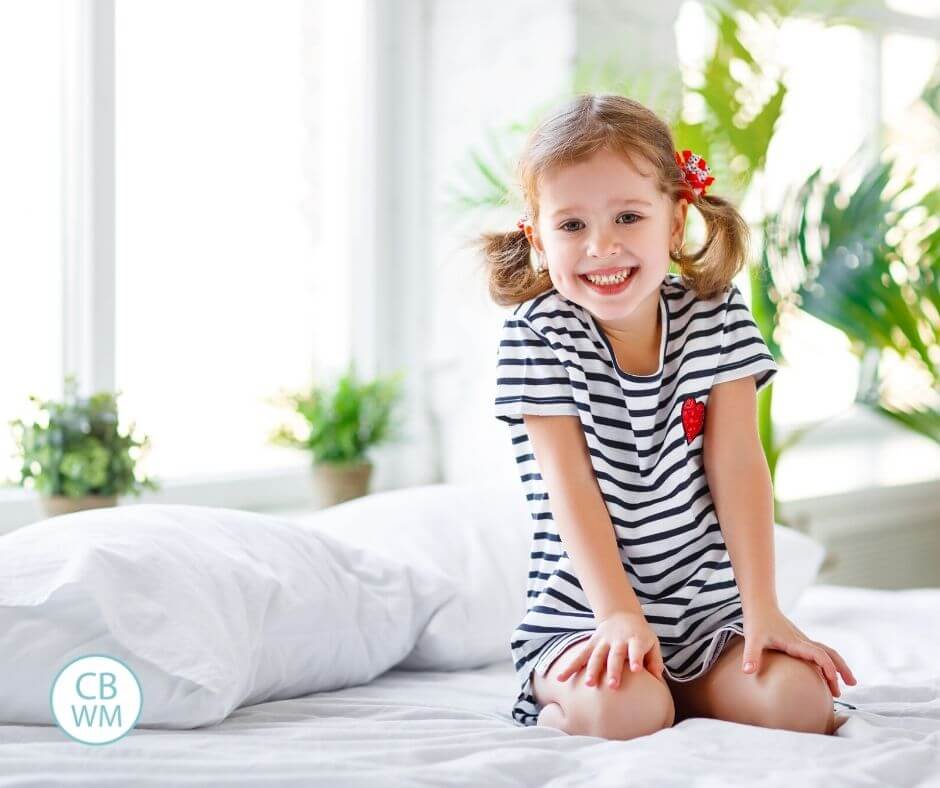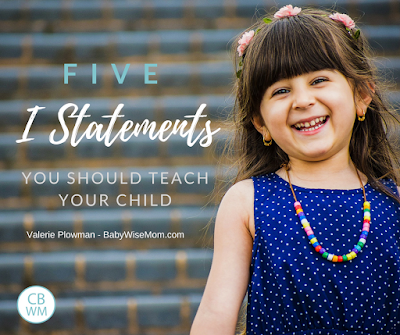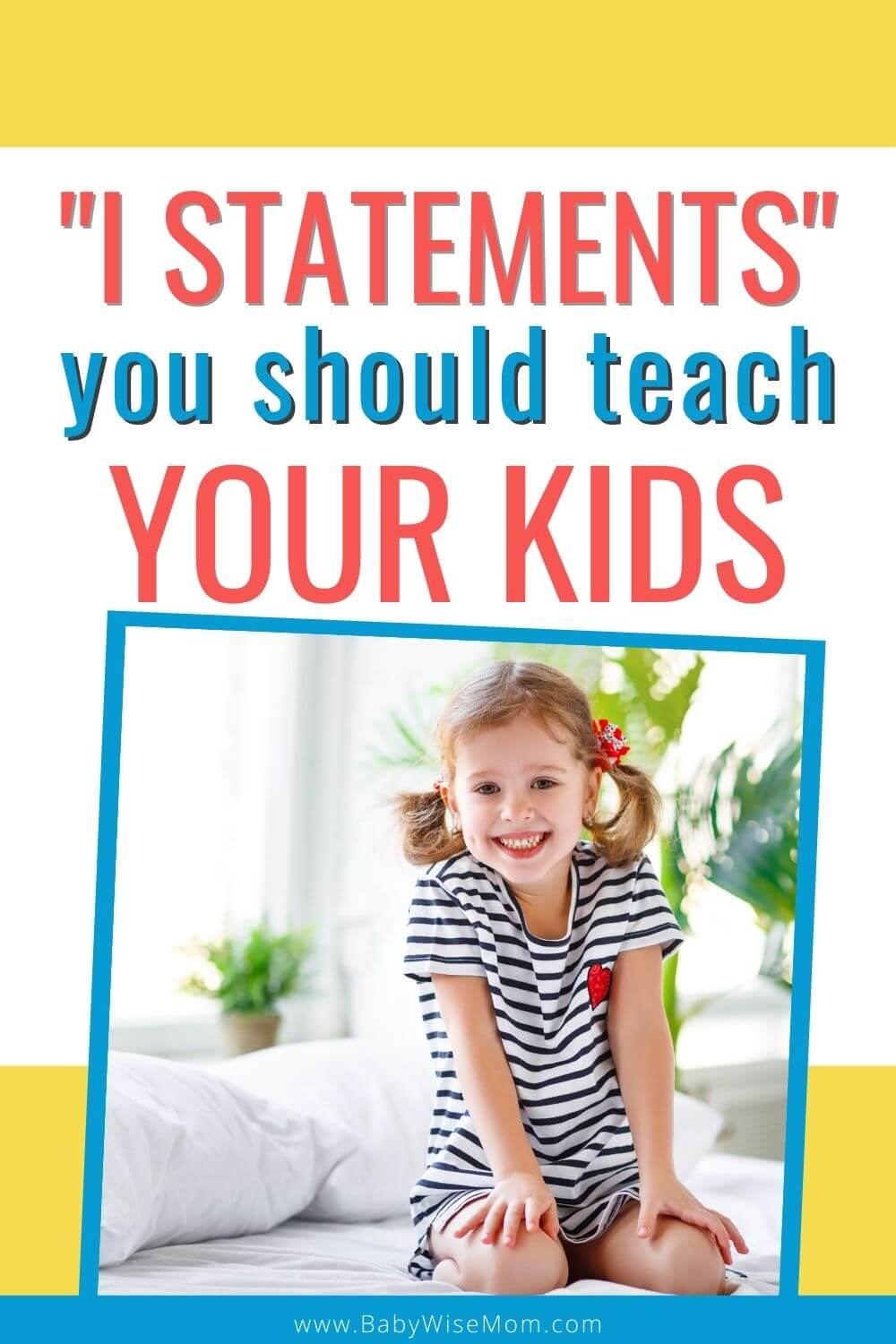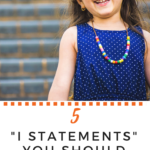These five statements will help your child to be responsible and bring positive contributions to all they interact with.

“She made me get mad!” came the crying protest from my cute little youngest child.
“No, sweetie. She can’t make you do anything. You chose to feel that way.”
It is very important for me to teach my children that they are the masters of their own fate and the captains of their own souls.
For one, yes, I want them to be responsible people when they grow up. But that isn’t the only reason to be personally responsbile.
I also want them to be kind and patient. I want them to be empowered to protect themselves from people who would take advantage of them in any way.
I statements can do all of that and more. Look these over and teach them to your children. Make these statements part of their reality.
Here are five “I Statements” to teach your children.

Post Contents
I Am In Charge
I love the statement “I am in charge.”
I decide what I do and when I do it.
I decide who touches me and who doesn’t.
This can be a tricky statement because you obviously don’t want your 8-year old retorting, “I don’t have to do my chores because I am in charge.”
As you teach this statement, you can start with what she is in charge of now. So not just “I am in charge” as a blanket stastement, but add the what.
“I am in charge of my emotions.”
Then you can add to what the child is in charge of and add things to it as the child gets older.
“I am in charge of my body.” “I am in charge of doing my homework.” “I am in charge of packing my library book.”
I Am Responsible
I am responsible.
Words of affirmation are powerful. A child saying to herself, “I am responsible” leads to her being responsible. She will grow to believe it.
When she messes up, she will be more likely to take responsibility for it and try to fix it. Always keep in mind that we need to teach our children what words mean, however.
We can’t just have the child say, “I am responsible” and believe responsibility will flow from it.
We need to teach what “responsible” means and what it looks like. We need to use the word in our interactions with the child.
To be responsible means:
- You have an obligation to something
- You have control over something
- You have care over something or someone
- You have a job
- You have a role
>>>Read: How to Raise Independent and Responsible Children
I Choose My Actions and Mood
I choose my actions and my mood.
This is a very big one for me.
So much of life is what we make of it. So many situations can be looked at from a positive light or a negative light, and if we choose to focus on that negative, we get more negative.
I want my children to know and realize that they get to choose their mood. No one else chooses it for them.
When the child is feeling grumpy, he can change that because he chooses his mood. His mood is not dependent on the circumstances he finds himself in. He chooses his mood.
This is NOT easy. We all know that. Mothers know the impact of hormones, hunger, and sleep deprivation.
It isn’t as simple as saying, “I choose my mood so I choose happiness” and happiness magically flows from you.
It takes effort and work, but with time and practice, it gets easier. It is a skill to choose happiness and optimism.
Did you know that as we think, our brain forms synapses. These are paths our thoughts follow. As we focus on negative thoughts, our brain forms those paths. Then in the future, we follow those same paths.
But if we focus on positive thoughts, then our brain forms those synapses. In the future, our thoughts follow positive thoughts.
You can literally train your brain to look on the positive side of situations.
Actions are another big one.
“She made me mad so I hit her! It is her fault!”
No. You choose your actions. No matter how mad, sad, excited, etc. you get, you choose the actions that accompany that feeling.
Let me add a caveat here. I don’t want my children to bury emotions. I don’t think that is healthy. I want them to know it is okay to feel.
It is a balancing act to allow feelings to flow while also choosing your mood. I think we can allow the emotion of a moment to run its course, but then it is how we respond after that moment that can shape and define us.
Another caveat is that some people suffer from mental health difficulties. These cannot be ignored and should be treated by a professional.
>>>Read: Best Tips for Parenting an Anxious Child
I Do Not Blame Others
I once had a vet tell me to never scold my child for doing anything to the dog in front of the dog.
The dog needs to always know the child can’t be blamed for how the dog responds. When dogs think they can get away with something if a child “started it,” the dog will not exhibit self control.
If a dog is smart enough to pick up on that, then a child is absolutely capable.
When your children fight, it can be wise to talk to them separately about how they shouldn’t do something that elicits emotions in the siblings.
It isn’t brothers fault that sister hit him.
Each child needs to know that the actions the child takes are all on the individual.
No matter how mad you are. No matter how rude someone else was. It is your fault if you respond in a way you shouldn’t.
My three oldest children all had the same teacher in first grade. Something I love about her is when a child says, “Oh! My mom didn’t put my library book in my backpack!” her response is always, “That isn’t mom’s job.”
She really helps those little first graders learn that they can’t blame others and they need to be personally responsible.
Mom isn’t a scapegoat.
I think at this point in the I Statements, you can see how these kind of blend together.
I don’t blame others because I am responsible, in charge, and I choose my own actions.
I Do The Right Thing
I choose the right.
I do what I should. No matter how hard it can be, I will be found doing what is right.
This is not always easy.
The older children get, the more they care about what peers think of them. A five year old might not care what their classmates think, but a ten year old most likely will.
Brayden is one who does not care at all what others think. Right will be right, truth will be defended, and he will do what he should no matter what anyone has to say about it. He is in tenth grade and still holding true to that philosophy in life.
Kaitlyn, on the other hand, has been concerned with what others thought basically since I have known her. Seriously! She has not always brave enough to stand up for what is right. She hates confrontation. She will do the right, but she might sit silently by while others do not.
We really had to work with her over the years to come up with strategies to make this work for her non-confrontational personality.
So part of “I do the right thing” for me is “I stand up for what is right.” That isn’t easy. It is scary and has the potential to impact you socially.
Part of the power in these I statements is giving your child the empowerment to be confident in these statements. They become a mantra. They become a part of who the child is.
We Parents Have To Believe The Statements
Okay parents. We have to believe these statements if they are going to stick.
We need to believe that yes, the child is responsible. Sometimes that will mean we don’t come to the rescue when a library book is left home and they call and ask us to take it to the school.
That means we don’t blame others when our child makes a poor choice. We don’t blame the teacher, friends, coach, or siblings.
We encourage them to the right thing even when it is scary.
We need to live these I statements for ourselves AND for our children.
Related Posts

This post originally appeared on this blog January 2018

